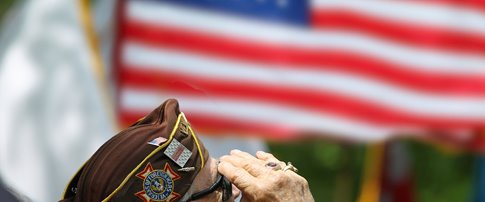Serving Those Who Served: Veterans Health in Rural America

This Veterans Day, we remember and honor those rural veterans who have served our nation. More than a quarter of the country's veterans live in rural communities and a disproportionate number of those serving in the military hail from rural communities.
The poverty rate for all rural veterans is 6.9 percent, and this rate increases to 8.6 percent for veterans in the most rural counties. The age of veterans increases as they move into more rural areas. Approximately 2.8 million Veteran Affairs (VA) health care patients are affected by a service-related injury, and 1,027,000 of those patients live in rural areas. Rural Americans are on average older, sicker, and poorer than their urban and suburban counterparts, and veterans in rural America are no different. Because of their service to our country, they often face health challenges and complications that their rural neighbors don’t have to consider.
3.2 million rural veterans are enrolled in the VA health care system, comprising 35% of total enrollees. Despite higher numbers of veterans in rural areas, VA facilities are scarce in rural America. Many veterans living in rural areas fail to get the help they need and are entitled to because of barriers to care. Unsurprisingly, the largest barrier is often the geographic distance to the nearest VA facility.
The Veterans Access, Choice, and Accountability Act of 2014 provided new authority and tools to help support and reform the VA through the establishment of the Veterans Choice Program. While this program has created new opportunities and options for care, there’s still more work to do. Through the Veterans Choice Program, rural veterans who qualify can receive non-VA healthcare instead of waiting for an appointment at the VA or traveling to a VA facility. The Veterans Choice Program determines eligibility for non-VA care by proximity to a Community-Based Outpatient Clinics (CBOC), but sometimes CBOCs, while geographically convenient, don’t provide the necessary treatment options. As Senator Jerry Moran, R-KS, explains, “…many rural Kansas veterans are still unable to access the care they need because common sense is not prevailing… the VA is implementing the Choice Act in a way that only takes into account distance to a VA medical facility, and not whether that facility can actually provide the medical services a veteran requires.”
Congress and the VA must find ways to ensure that access to non-VA community care is determined by services provided at a CBOC or VA facility. We need to work together to expand opportunities for non-VA community care. VA facilities could expand choices by providing care to veterans facing geographic barriers through partnerships with Rural Health Clinics (RHCs) and hospitals to deliver care via telemedicine, mobile VA clinics, and community based outpatient clinics.
Legislation on this issue was previously introduced by Senator Moran with Senators Jon Tester (D-MT), Angus King (I-ME), Steve Daines (R-MT) and Susan Collins (R-ME). This April, Senator Tester introduced the Veterans Choice Program Improvement Act, which was signed into law on April 19th. This legislation works to cut through red tape so that veterans can access care more quickly, reimburses community providers for veteran care, and reduces out-of-pocket costs for veterans receiving care through the Choice Program.
Most recently, the VA submitted the Veterans Coordinated Access & Rewarding Experiences (CARE) Act to both the House and Senate Veterans Affairs committees. The bill would eliminate the current wait time (30-Day) and distance (40 miles) requirements under the Choice program. VA Secretary David Shulkin explained the program, "We want veterans to work with their VA physicians to make informed decisions that are best for their clinical needs, whether in the VA or in the community, and this bill does just that, while strengthening VA choices at the same time.” NRHA will continue to monitor all of these proposals to ensure that rural veterans have access to quality, affordable care in their communities.
Veterans are often pillars and leaders in their rural communities. They have committed their lives to protecting and serving the country. NRHA applauds their service. NRHA has consistently been a staunch advocate for expanding access to care for rural veterans, including improving availability of providers, care delivery mechanisms and provider understanding of the special needs of rural veterans. The purpose of the NRHA Rural Veterans Health Initiative is to provide leadership to address access to health care needs of rural veterans. The five-year initiative began in 2014 with support from the Federal Office of Rural Health Policy. Annual meetings are held to assess current issues impacting rural veterans’ care. The initiative includes: Collaboration on placement of transitioning military personnel into health care positions; Dissemination of best practices; Additional collaboration with the VA Office of Rural Health to highlight rural veterans’ research and communication of models of care.
This Veterans Day, let’s work together to ensure that we can serve those who served our country by providing them the care they need, regardless of where they live.
